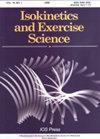优秀与次优秀女足运动员下肢力量与训练经验
IF 0.7
4区 医学
Q4 ENGINEERING, BIOMEDICAL
引用次数: 0
摘要
背景:女子足球中不同表现水平的力量差异尚不清楚。此外,尽管这项运动的职业化程度越来越高,但全职训练和力量之间的关系尚未得到探索。目的:本研究的目的是检查优秀和次优秀女子足球运动员的膝关节屈/伸肌和髋关节内收/外展肌力量差异,然后确定力量表现与年龄、足球经验年数(FE)和全职训练年数(FTT)的关系。方法:对15名优秀和15名次优秀职业女足运动员进行测试。主要结果是60、180和300°/s时膝关节屈伸肌的同心等速峰值力矩,以及髋内收肌(ADD)和外展肌(ABD)的等速力。结果:与次精英组相比,精英组膝盖屈肌绝对值(300°/s: 47.13-49.33 Nm vs 37.33-38.93 Nm, p< 0.05)和归一化值(300°/s: 0.76-0.80 Nm/kg vs 0.59-0.62 Nm/kg, p< 0.05)较高,归一化ADD (5.64-5.66 N/kg vs 4.98-5.05 N/kg, p< 0.05)和ABD力(5.80-6.00 N/kg vs 5.26-5.39 N/kg, p< 0.05)较高。年龄、FE、FTT与膝关节屈肌值相关(r= 0.381 ~ 0.559, p< 0.05)。此外,FTT与标准化ADD和ABD力相关(r= 0.362 ~ 0.546, p< 0.05)。结论:次优秀的女足运动员可能需要额外的膝关节屈肌和髋关节强化才能达到优秀水平。那些年龄较小或FTT较低的人也可以在参加全日制训练环境之前进行额外的下肢强化训练。本文章由计算机程序翻译,如有差异,请以英文原文为准。
Lower limb strength and training experience in elite and sub-elite female footballers
BACKGROUND: Strength differences between performance levels remain unclear in female football. Furthermore, the relationship between fulltime training and strength has been unexplored despite increased professionalisation in the sport. OBJECTIVE: The aims of this research were to examine knee flexor/extensor and hip adductor/abductor strength differences between elite and sub-elite female footballers, and then determine the relationship of strength performance to age, years of football experience (FE), and years of fulltime training (FTT). METHODS: 15 elite and 15 sub-elite professional female footballers were tested. The main outcomes were concentric isokinetic knee flexor and extensor peak moment at 60, 180, and 300∘/s, and isometric hip adductor (ADD) and abductor (ABD) force. RESULTS: The elite team had higher absolute (300∘/s: 47.13–49.33 Nm vs 37.33–38.93 Nm, p< 0.05) and normalised (300∘/s: 0.76–0.80 Nm/kg vs 0.59–0.62 Nm/kg, p< 0.05) knee flexor values, and higher normalised ADD (5.64–5.66 N/kg vs 4.98–5.05 N/kg, p< 0.05) and ABD force (5.80–6.00 N/kg vs 5.26–5.39 N/kg, p< 0.05), compared to the sub-elite team. Age, FE, and FTT were correlated to knee flexor values (r= 0.381–0.559, p< 0.05). Additionally, FTT was correlated with normalised ADD and ABD force (r= 0.362–0.546, p< 0.05). CONCLUSION: Sub-elite female footballers may require additional knee flexor and hip strengthening in order to make the step up to the elite level. Those who are younger or have low FTT may also be recommended additional lower limb strengthening ahead of joining a fulltime training environment.
求助全文
通过发布文献求助,成功后即可免费获取论文全文。
去求助
来源期刊

Isokinetics and Exercise Science
医学-工程:生物医学
CiteScore
1.20
自引率
14.30%
发文量
37
审稿时长
>12 weeks
期刊介绍:
Isokinetics and Exercise Science (IES) is an international journal devoted to the study of theoretical and applied aspects of human muscle performance. Since isokinetic dynamometry constitutes the major tool in this area, the journal takes a particular interest in exploring the considerable potential of this technology.
IES publishes studies associated with the methodology of muscle performance especially with respect to the issues of reproducibility and validity of testing, description of normal and pathological mechanical parameters which are derivable from muscle testing, applications in basic research topics such as motor learning paradigms and electromyography. The journal also publishes studies on applications in clinical settings and technical aspects of the various measurement systems employed in human muscle performance research.
The journal welcomes submissions in the form of research papers, reviews, case studies and technical reports from professionals in the fields of sports medicine, orthopaedic and neurological rehabilitation and exercise physiology.
 求助内容:
求助内容: 应助结果提醒方式:
应助结果提醒方式:


